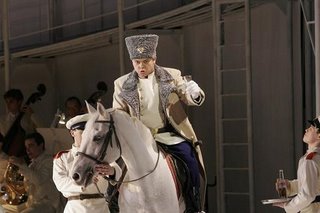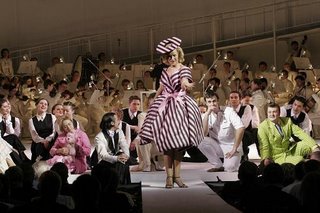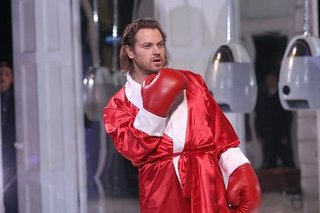Two Comedies of Errors
 There is nothing either good or bad (about updating an opera to modern times) – but execution makes it so. The Kirov Opera, in its fifth annual hard-currency residency at the Kennedy Center, brought two comedies (a concert performance of Lady Macbeth of Mtsensk follows Sunday afternoon [Ed. Review here]), both in modern guises, and made them exemplars of the difference between thoughtful and tasteless updating. One was Rossini’s Il viaggio a Reims which is indeed (pun intended) a trip. The other is Falstaff, Verdi’s grand comedy, which, left to the Kirov, is no trip but an endurance test for the audience.
There is nothing either good or bad (about updating an opera to modern times) – but execution makes it so. The Kirov Opera, in its fifth annual hard-currency residency at the Kennedy Center, brought two comedies (a concert performance of Lady Macbeth of Mtsensk follows Sunday afternoon [Ed. Review here]), both in modern guises, and made them exemplars of the difference between thoughtful and tasteless updating. One was Rossini’s Il viaggio a Reims which is indeed (pun intended) a trip. The other is Falstaff, Verdi’s grand comedy, which, left to the Kirov, is no trip but an endurance test for the audience. It might be surprising that what should be Rossini’s most dated opera (after all it was composed explicitly for the coronation of Charles X, ultra-royalist King during the short-lived French period of restoration, in 1835) was the entertaining and enjoyable one. (Because of Charles’ traditionalism the coronation took place in the cathedral of Rheims, the coronation location of choice during the Ancien Régime. His rule lasted scarcely five years, Rossini’s opera even less.)
It is one of the great ironies that this once-performed, immediately forgotten ‘event-comedy’ should have aged much less than all other Rossini comedies. Comedies, the libretti and dramatic action of which can only be called idiotic, of which there are many and on which Rossini wasted much good music. In Il viaggio we have a situation comedy that relies, for the most part, on personality types. It is (comparatively) delectable theater in its best parts, and the Kirov/Théâtre Châtelet production (Ionarts reviewed it in St. Petersburg, a while back) by Alain Maratrat (direction), Pierre Alain Bertola (set design), Mireille Dessingy (costumes), and Pascal Mérat (lighting) enhances it by playing off its inherent silliness.
The means to achieve this borrow heavily on European theater tradition from the last 15 years (which has now arrived in Russia) and are by no means original, but in the opera house, across the Atlantic, they can still instill some sense of the novel. The pit covered, the orchestra on stage, a walk-way extended from the stage across the orchestra seating (unfortunately largely invisible to the audience in the upper tiers) it started before it even started: Singers and musicians arrived as guests, one by one or in pairs, with their luggage, from all sides, climbing on stage and taking their various places. Audience members were greeted as old acquaintances; all good fun - if outlasting its humorous effect by several minutes. The last tourist to arrive through the isles, trench-coat clad, with hat and suitcase, was a certain Mr. Gergiev – to lead the ‘Bath & Festival Orchestra’ (in white) from the back of the sparse stage.
 From thereon it continued in hammed up, riotous style. A romp of fun-house acting, winking, fainting, exhilaration, exclamation (from the balconies, and from amid the aisles), audience molestation and what ever else they could think of. There was much decent and good singing (if little that was outright excellent and little by way of proper pronunciation) and even more great acting. Anastasia Kalagina’s Madame Cortese, once her voice was running on operating temperature, impressed with dry, well contained high notes. Larisa Yudina as the outrageous, over-the-top, fashion-obsessed Parisienne Contessa de Folleville stole the show with her hilarious acting – and proved to be one of the finest singers on stage (and off stage) in the bargain.
From thereon it continued in hammed up, riotous style. A romp of fun-house acting, winking, fainting, exhilaration, exclamation (from the balconies, and from amid the aisles), audience molestation and what ever else they could think of. There was much decent and good singing (if little that was outright excellent and little by way of proper pronunciation) and even more great acting. Anastasia Kalagina’s Madame Cortese, once her voice was running on operating temperature, impressed with dry, well contained high notes. Larisa Yudina as the outrageous, over-the-top, fashion-obsessed Parisienne Contessa de Folleville stole the show with her hilarious acting – and proved to be one of the finest singers on stage (and off stage) in the bargain. Riding in on horseback (indeed, on a real horse!) was Daniil Shotda’s Russian general, packed full of stereotypes (downing Vodka is his first act) as just about every character in the work. (“To the Russian talk ‘Empire’, to the German, talk counterpoint”.) His singing was not quite as impressive as his entrance: Back in the throat (one is tempted to say in typical Russian-tenor style) and with little projection, it was neither bad nor noticeably good. The first entrance of Irma Gigolashvili’s outlandishly wigged and clad ‘Roman poetess’ Corinna (her hair and frock lit from the inside, accompanied by a harp wheeled on stage) was another spectacle… as was the excellent flutist-girl that, all awhile playing her virtuoso parts, acted out the story better than some actors could with the advantage of using words.
Tim Page, Kirov's 'Il Viaggio a Reims': Zanything Goes (Washington Post, January 29) Tim Smith, Kirov lights up stage with Rossini work (Baltimore Sun, January 29) Tim Page, 'Falstaff': From Russia, With Updates (Washington Post, February 2) Charles T. Downey, Falstaff as Freak Show (DCist, February 2) Tim Smith, A modernized and punchy 'Falstaff' (Baltimore Sun, February 3) T. L. Ponick, Kirov's 'Falstaff' vision an unsightly mess (Washington Post, February 3) |
If Il viaggio was mostly-good, Falstaff was mostly bad… with momentary strokes of the awful interspersed, and too little excellence to redeem it. Falstaff need not wear a fat-suite (indeed, it is nice to be saved the standard issue Falstaff costume), nor need Falstaff necessarily traipse around in Shakespeare’s time. Lewd, drunken gentlemen who wish to live off well-to-do women and cash in a few amorous benefits along the way are hardly an ancient phenomenon. Having Ms. Quickly (Ana Kiknadze), Nannetta (Olga Trifonova), Alice Ford (Tayana Pavlovskaya), and Meg (Elena Sommer) open the second scene in a hair-salon is not too far fetched, either, and redeemably cute: Bored high-society ladies hanging out together, trying to impress and busy gossiping: their realistic portrayal must have been the easiest thing for Pavlovskaya and company.
 Even the first scene of the third act – in a drive-in theater with the backs of little Wartburg’s facing the audience – could have been part of an enjoyable package… if only everything around it had been better, or made more sense, or tried less hard. As it was, the ‘tricks’ of this production (from the ‘American-Gangster-as-seen-by-Russians’ theme to the three ballet-spirit-fairy-mimes swirling about to pad the story where the singers weren’t able to tell it) were too much to take on one night. Even before the leather-and-chain ballet of S&M sex-gimps comes out as badly choreographed spirits in the finale, this production appears like a caricature of someone’s mistaken understanding of what constitutes “modern”. It’s a slightly cheap, seedy reproduction of bits and pieces seen before and elsewhere… trying so anxiously to be of its time but being that nowhere, except, perhaps, in the today of Moscow or St. Petersburg where money substitutes for style and the desperate attempt to be chic and ‘in’ can never quite shake that sense of having tried a little too hard.
Even the first scene of the third act – in a drive-in theater with the backs of little Wartburg’s facing the audience – could have been part of an enjoyable package… if only everything around it had been better, or made more sense, or tried less hard. As it was, the ‘tricks’ of this production (from the ‘American-Gangster-as-seen-by-Russians’ theme to the three ballet-spirit-fairy-mimes swirling about to pad the story where the singers weren’t able to tell it) were too much to take on one night. Even before the leather-and-chain ballet of S&M sex-gimps comes out as badly choreographed spirits in the finale, this production appears like a caricature of someone’s mistaken understanding of what constitutes “modern”. It’s a slightly cheap, seedy reproduction of bits and pieces seen before and elsewhere… trying so anxiously to be of its time but being that nowhere, except, perhaps, in the today of Moscow or St. Petersburg where money substitutes for style and the desperate attempt to be chic and ‘in’ can never quite shake that sense of having tried a little too hard. With that impression pushed down one’s throat, it couldn’t even offend any further that Nannetta (as the fairy) sings from a hoisted-up car (a Ford, for subtleties’ sake) and then a bed, pulled by prostitutes. Or that the producers throw in a bit of gratuitous attempted rape of Ms. Quickly in Scene I of Act III in the obscene hope for a cheap laugh. (Icy confusion and muted applause was the shell-shocked reaction at such tastelessness.) Or that the Italian was so excruciatingly bad, some cast members – like Andrei Popov (Dr. Caius) – might as well have sung in Russian with no one able to tell the difference. Or that there descended a big, blinking “Tutto nel mondo è burla” red-white neon-billboard in the faux Coca-Cola style during the ‘grand finale’. Director Kirill Serebrennikov earns himself the tag of being Russia's answer to Euro-trash.
An astounding victory of bad taste, ameliorated only in faint degrees by the singing of Edem Umerov (Falstaff), Ms. Trifonova, Andrei Ilyushnikov’s Fenton (who replaced the scheduled Daniil Shtoda), and most of the rest of the female cast. The playing from the pit under Gergiev was, fittingly, on the crass side and a bit sporadic. Surely not the finest of contributions to the Shakespeare in Washington festival.























































No comments:
Post a Comment